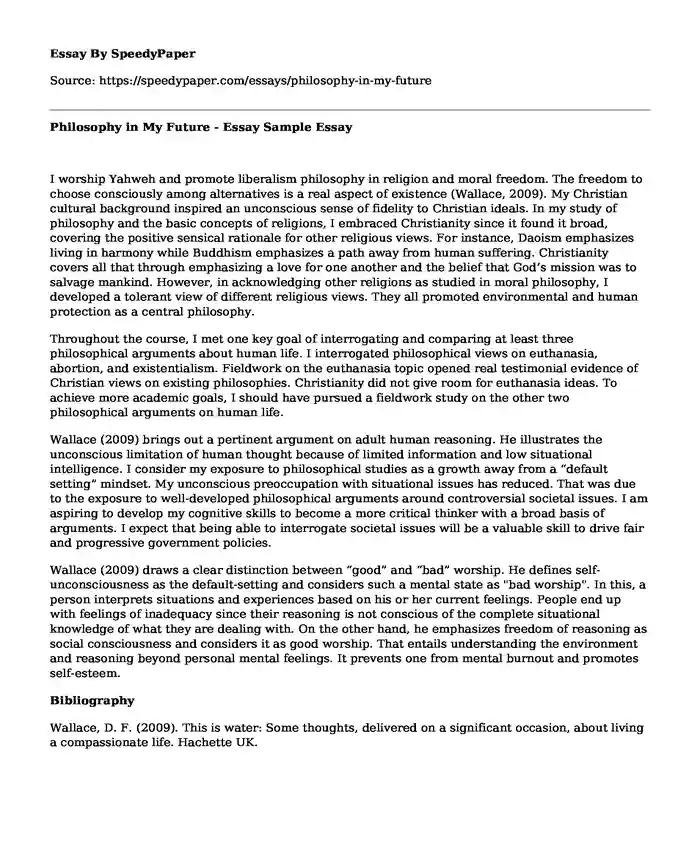
| Type of paper: | Essay |
| Categories: | Philosophy Religion |
| Pages: | 2 |
| Wordcount: | 444 words |
I worship Yahweh and promote liberalism philosophy in religion and moral freedom. The freedom to choose consciously among alternatives is a real aspect of existence (Wallace, 2009). My Christian cultural background inspired an unconscious sense of fidelity to Christian ideals. In my study of philosophy and the basic concepts of religions, I embraced Christianity since it found it broad, covering the positive sensical rationale for other religious views. For instance, Daoism emphasizes living in harmony while Buddhism emphasizes a path away from human suffering. Christianity covers all that through emphasizing a love for one another and the belief that God’s mission was to salvage mankind. However, in acknowledging other religions as studied in moral philosophy, I developed a tolerant view of different religious views. They all promoted environmental and human protection as a central philosophy.
Throughout the course, I met one key goal of interrogating and comparing at least three philosophical arguments about human life. I interrogated philosophical views on euthanasia, abortion, and existentialism. Fieldwork on the euthanasia topic opened real testimonial evidence of Christian views on existing philosophies. Christianity did not give room for euthanasia ideas. To achieve more academic goals, I should have pursued a fieldwork study on the other two philosophical arguments on human life.
Wallace (2009) brings out a pertinent argument on adult human reasoning. He illustrates the unconscious limitation of human thought because of limited information and low situational intelligence. I consider my exposure to philosophical studies as a growth away from a “default setting” mindset. My unconscious preoccupation with situational issues has reduced. That was due to the exposure to well-developed philosophical arguments around controversial societal issues. I am aspiring to develop my cognitive skills to become a more critical thinker with a broad basis of arguments. I expect that being able to interrogate societal issues will be a valuable skill to drive fair and progressive government policies.
Wallace (2009) draws a clear distinction between “good” and “bad” worship. He defines self-unconsciousness as the default-setting and considers such a mental state as "bad worship". In this, a person interprets situations and experiences based on his or her current feelings. People end up with feelings of inadequacy since their reasoning is not conscious of the complete situational knowledge of what they are dealing with. On the other hand, he emphasizes freedom of reasoning as social consciousness and considers it as good worship. That entails understanding the environment and reasoning beyond personal mental feelings. It prevents one from mental burnout and promotes self-esteem.
Bibliography
Wallace, D. F. (2009). This is water: Some thoughts, delivered on a significant occasion, about living a compassionate life. Hachette UK.
Cite this page
Philosophy in My Future - Essay Sample. (2024, Jan 26). Retrieved from https://speedypaper.com/essays/philosophy-in-my-future
Request Removal
If you are the original author of this essay and no longer wish to have it published on the SpeedyPaper website, please click below to request its removal:
- Religion Essay Sample: The Help of Hospitals in New France with the Conversion Process
- Free Essay Providing Analysis of the Dialogue Between Crito and Socrates
- Essay Sample on Tense relationship
- Essay Example: An Overview of the Basic Ideas of Daoism and Buddhism
- Paper Example: Issues Faced by American Muslim Women
- David Hume's View on Skepticism - Free Essay Example
- Enlightenment Ideals: Kant and Beccaria on Law-Governed Peaceful Societies - Paper Example
Popular categories




